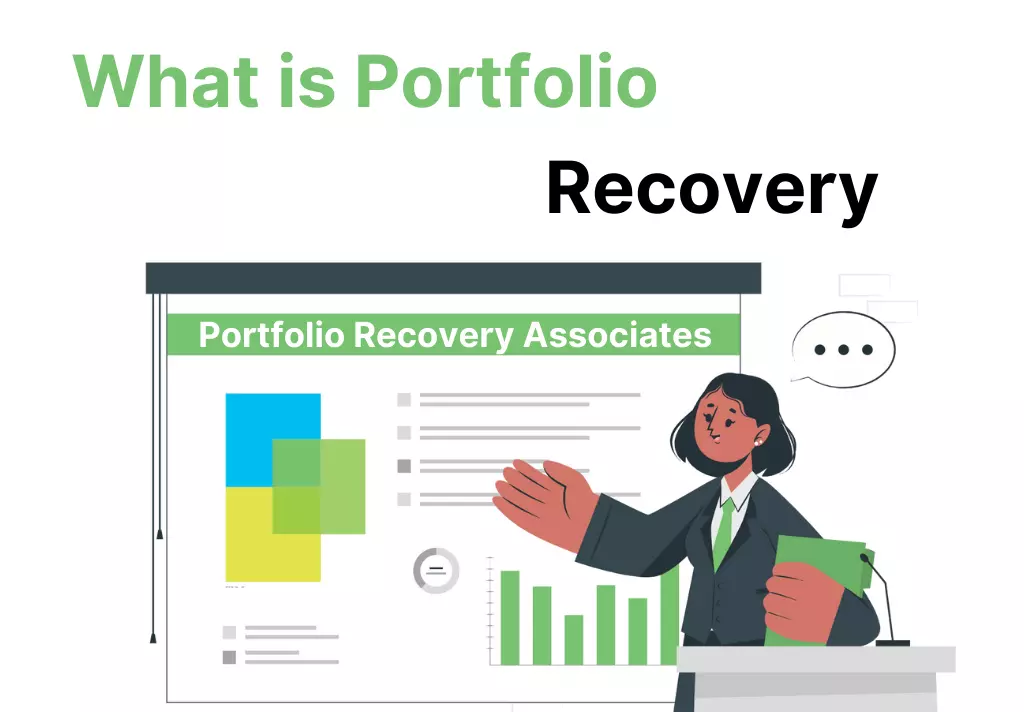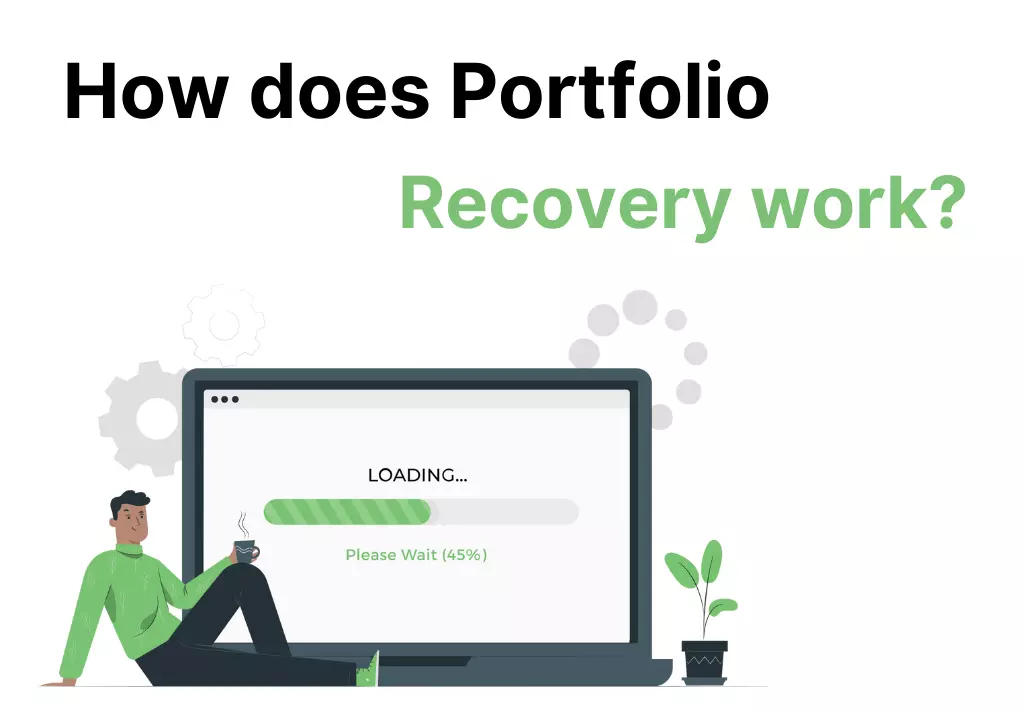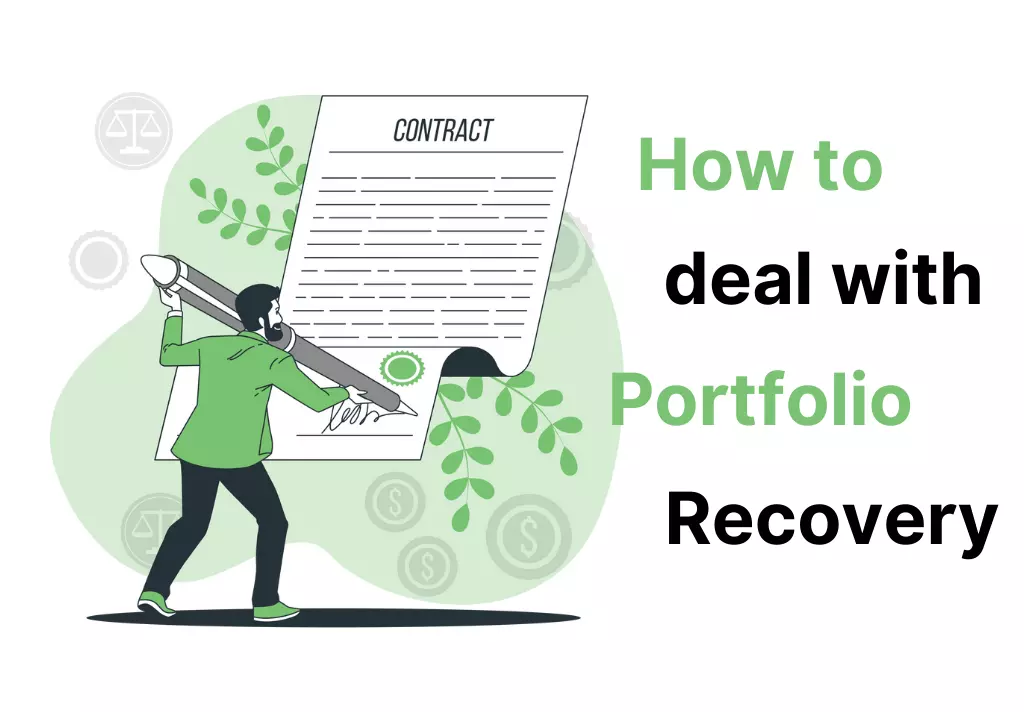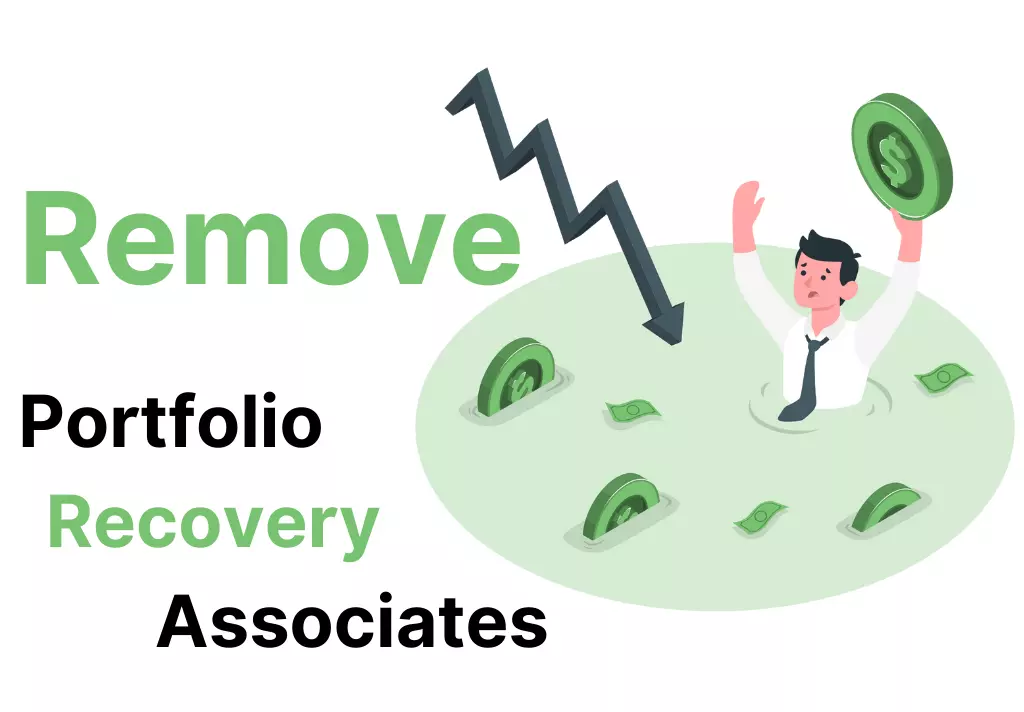Do you see Portfolio Recovery Associates LLC on your credit report? There is no need to feel alone.
Debt collection agencies like this one recoup millions of dollars each year from American consumers like you.
Find out what Portfolio Recovery Associates are, how they operate, and how you can get them removed from your credit report.
Table of Contents
What is Portfolio Recovery

Portfolio Recovery Associates, LLC (PRA, LLC) is among the largest debt collection agencies in the United States. Founded in 1996 in Virginia Beach, Virginia, the company is currently located in Norfolk, Virginia.
Steven Stevenson currently holds the title of CEO and President. He and Steven Fredrickson founded the company together.
In addition to purchasing bulk debt from banks and creditors, PRA also buys overdue loans, utility bills, and unpaid tuition at a discount. Once the debt is purchased, PRA contacts the borrower to collect payment.
Additionally, you should be aware that Portfolio Recovery Associates isn’t the most reputable debt collection agency.
In 2014, the Attorney General of New York State settled with Portfolio Recovery Associates for improperly collecting debt from consumers. PRA has faced several actions for improper practices in recent years.
Also Read: why can’t i keep a job [solution 101]
How Portfolio Recovery Works ?

Portfolio Recovery collects large amounts of consumer debt for pennies on the dollar. Profits are made when they try to collect repayment from you, the borrower.
The PRA Group informs you of the debt and attempts to collect it after purchasing it.
Portfolio Recovery Associates make money only when debtors pay off their debts, so they are relentless. They will likely contact you, send you letters, and even sue you.
If you choose to ignore them, managing Portfolio Recovery usually goes as follows:
- You receive a letter from PRA or PRA’s representative requesting that you pay off a debt in collections
- The PRA will serve you with a summons and complaint if you ignore the letter
- A default judgment will be entered if you do not respond within 20 days
- When you default on a judgment, PRA can garnish your wages, access your bank accounts, or put a lien on your property
It doesn’t need to happen to you in the way described above.
Avoid a lawsuit by negotiating with PRA, learning whether the debt alleged is true, and removing the negative information from your credit report.
How To Deal With Portfolio Recovery

You should be aware that dealing with a collection agency is far from simple. There are deadlines and nuances to learn, as well as the possibility of legal action. Make smart choices when dealing with Portfolio Recovery Associates so that your credit score doesn’t suffer.
Here are a few things you should know:
- Communicate only via email
- Keep an eye on deadlines
- Never divulge your bank account information
1. Communicate only via email
Likely, you have already received a phone call or a letter from PRA, LLC.
We recommend communicating only via mail with Portfolio Recovery Associates in the future.
You can answer, but tell them all future communication will be done through email whenever they call again. You are entitled to request this under the Fair Debt Collection Practices Act.
Even though communicating by mail may seem like a hassle, there are several benefits:
- Prevents potentially harassing and intrusive telephone calls
- Increases your control over communication
- If you make any deals, make sure they are in writing so they can be defended in court
- Creates a paper trail, which is essential if the case goes to court
There is an email address and a live chat feature on PRA’s website, but these are not substitutes for mail communication.
2. Keep an eye on deadlines
It’s not fun to deal with debt, but you must get rid of it as soon as possible. Within 30 days of PRA contacting you, you can request more information or take another action. If you don’t respond promptly, you might lose out on negotiating a lower payment, disputing the debt, or paying for deletion.
Keep track of dates in a calendar and read all communications carefully. Prepare your responses as soon as possible.
3. Never divulge your bank account information
If you owe money, do not provide your bank account information. PRA may insist that you do so that they can deduct what you owe, but this is not the case. You are at liberty to refuse and to mail a check instead.
Remove Portfolio Recovery Associates (PRA Group) From Your Credit Report

An unpaid bill or a late car payment shows up on your credit report as red flags. Your credit report also shows who you owe money to.
Portfolio Recovery Associates obtained your debt from another creditor if your credit report indicates that you owe them money. Your debt could be recent, or it could be from years ago.
No matter what the debt is, you do not want it to affect your credit score.
Experian states that collections debt stays on your credit report for seven years.
When the debt first becomes delinquent or when you first miss a payment, the clock starts. The fact that your credit score influences your ability to rent an apartment, obtain a mortgage, lease a car, or borrow money, makes it vital to keep it as high as possible.
One way to maintain a good credit score is to remove negative information.
Follow these steps to remove Portfolio Recovery Associates from your credit report:
- Ask for validation that you owe the debt
- In the absence of sufficient proof
- If they do have enough evidence
- If they do have enough evidence
1. Ask for validation that you owe the debt
Debt collectors have only five days to provide you with a debt validation notice after first contacting you.
You will be given a notice detailing your debt and the name of your creditor. You can also find the information by logging into the PRA website and selecting the PRApay option.
As a debtholder, the debt validation notice will also inform you of your rights under the Fair Debt Collection Practices Act:
- If you dispute the debt in writing, you have 30 days to do so
- A collection agency sends you verification if you dispute a debt.
- Upon request, the collection agency will provide you with the original creditor’s name and address if you ask in writing within 30 days.
Ultimately, it is up to the collector to prove that you own the debt.
Regardless of whether you remember owing the money, the amount could be incorrect. This could be the result of a clerical error.
Request verification within 30 days of disputing the debt. It’s your right as a consumer, and it’s also a safeguard for you.
Debt disputes should not be conducted over the phone. You must send a debt validation request with a return receipt by certified mail if you want to dispute the debt. By doing so, a paper trail is left behind, and the debt collector is verified to have received the debt.
You should request the following in your letter:
- Approximately how much money is allegedly owed
- Original creditor’s name and mailing address
- You must prove your responsibility for the debt.
- A license from your state proving that the collection agency has the right to collect debts
Online, you can find sample dispute letters, or you can hire an attorney or credit repair company to write one for you.
2. In the absence of sufficient proof
Portfolio Recovery Associates cannot pursue payment against you without sufficient proof. Directly dispute the debt with the credit bureau to remove it from your credit report.
You should send in your debt validation letter, the return receipt, and any other relevant documentation for removal from your credit report.
Verify it has been removed after a few weeks, and once it has been removed, you are good to go.
3. If they do have enough evidence
Don’t pay yet. There are still options to remove the debt from your credit report.
Exchange Payment for Deletion
In order to make money, PRA needs you. Whether the late payment or owed debt shows up on your credit report isn’t important to them.
In exchange for prompt or partial payment, they often agree to remove the collection from your credit report.
To make it happen, follow these steps:
Put your request in writing
Over the phone, never negotiate a payment for deletion. Documentation is essential. Be sure to use the mail to make your request.
Consequently, if PRA fails to delete the collections after receiving payment, you will have proof that they did not keep their end of the bargain.
Don’t just take the representative’s word for it, no matter how nice they sound on the other end of the line.
Negotiate a reduced payment
PRA acquired your debt at a significant discount, so Portfolio Recovery Associates, LLC does not need you to pay it in full to make a profit. It would be best if you offered to pay 50% of what you owe and then negotiate from there.
It is possible to secure a savings offer that might surprise you.
Send a check by mail
You should mail a check only after you have reached an agreement in writing. Make sure not to divulge your bank information. Please make sure the check arrives by sending it certified mail with a return receipt.
Continue to follow up
Check your credit report within 30 days to see if the collection has been removed. Send them a letter describing the agreement and requiring that they follow it.
4. If they do have enough evidence
Portfolio Recovery Associates, LLC can be dealt with independently, but you do not have to.
It is possible to negotiate a settlement with Portfolio Recovery Associates using Credit Saint, or another credit repair company of your choice.
In addition, they can check your credit report for other errors and make recommendations to improve your score.
FAQ
Is Portfolio Recovery Legit?
If you see a company that you have never heard of on your credit report, it’s natural to ask if it’s legitimate or a scam.
It is a legitimate collection agency to work with Portfolio Recovery Associates. Despite that, it does not mean the debt they’re collecting is legit or that their practices are ethical.
As Portfolio Recovery Associates buys debt in bulk, mistakes can happen, and they may not be able to prove that you owe anything.
You must verify payments to PRA before it is made. If not, you might end up paying money you don’t owe.
Why is portfolio recovery calling me?
In order to collect a debt. In most cases, this is an old credit card debt. It might be several years old or several decades old.
There are important restrictions on PRA’s ability to contact you:
- You cannot be contacted by PRA if you send a cease and desist letter. If they contact you, you could sue under the FDCPA.
- PRA cannot automatically dial your cell phone if you have told PRA not to (see sample dispute letter) or if the original creditor didn’t have permission to do so. We are talking about the TCPA (Telephone Consumer Protection Act).
- Under most circumstances, PRA calls third parties (other than you or your spouse). For this type of abuse, you would sue PRA under the FDCPA.
- If PRA makes false or misleading statements in its calls, then they are violating the FDCPA.
Portfolio recovery settlement offer
A lump-sum settlement with Portfolio Recovery Associates can generally result in a better savings outcome. Settlements are typically half the amount owed.
With PRA, you can spread your payments out over several months or even years if you cannot make a lump sum payment to settle your debt. In the event of debt settlement, payment plans are a fantastic tool to prevent being sued by PRA.
The amount owed is valued at between 40 and 60 cents on the dollar by Portfolio Recovery Associates.
Portfolio Recovery Associates offers several reasons why you may want to resolve debt with them:
- You can resolve the debt through your resources.
- You do not want to be sued in court to collect your debt.
- Your credit report contains information about credit and finance goals you hope to achieve in the future.
- Portfolio Recovery Associates can help you settle your debts by offering a free estimate online.
Why is portfolio recovery calling me when I have no debt?
Portfolio Recovery Associates (PRA) and other debt collection agencies sometimes make harassing phone calls and send threatening letters. Sometimes, they might have your information in error and are sending collection notices to the wrong person.
FDCPA prohibits harassment and abusive calls. Have you experienced harassment from Portfolio Recovery Associates? Have you received threats of legal action? If so, you should take action.
- If you have sufficient evidence that this is not your debt, you might want to fight it. In other words, you are telling the creditor to prove that I owe the debt. It is Portfolio Recovery’s responsibility to confirm the debt. Unless you owe the debt, this case shouldn’t be complex.
- It is illegal for you to sign a contract, or you signed it based on false information. You may need outside assistance to determine if this applies to you.
Consider having a free consultation with a reputable debt collection attorney in this case.
The Consumer Law Firm of Francis Mailman Soumilas assists with illegal harassment and dispute resolution.
Should I Pay Portfolio Recovery Associates?
Do you need to pay PRA, LLC what they claim you owe?
Your situation will determine whether you have to pay PRA.
Regardless of your situation, you should not make any payments until you verify the alleged debt and request that it be removed from your credit report.
It’s important to remember that PRA needs you to make money, so you have some negotiating power. PRA buys debt in bulk, so it’s possible that an error occurred in their collection efforts.
Upon receiving notice of collections from PRA, you should:
- Pay as little as possible and still settle the debt
- Get your credit score re-established after the negative mark has been removed
Portfolio recovery statute of limitations
Among the things that debt collection companies such as Portfolio Recovery Associates are not allowed to do under the Fair Debt Collection Practices Act (FDCPA) are:
- Contact anyone who is not the principal debtor
- Threatened legal action, credit harm, or wage garnishment without any intention of implementing those threats
- Contact before 8:00 a.m. or after 9:00 p.m. at “unreasonable times.”
- Contacting you at the office of your employer, even if you have told them not to
- Informing your employer of your debt or disclosing any aspect of the debt to others is important
- When calling, use profane or obscene language
- Send collection letters that appear to come from a court or government agency
- Threatening you with jail time for unpaid debt
Fake debt collection calls
Despite portfolio recovery association being a legitimate debt collector, some scammers may try to get you to pay on debts you don’t owe or on debts that don’t even exist.
How to recognize debt collection scams
1. Refuses to provide you with information
If you dispute the debt, the collector must provide you with information such as the creditor’s name and the amount owed. If you dispute the debt, the collector must obtain verification of the debt. Suppose the debt collector fails to provide this information during the initial contact with you. In that case, they must send you a written notice within five days of the initial contact.
2. Makes you pay by money transfer or prepaid card
This payment method is attractive to scammers since it may be untraceable. You may have a hard time recovering your money if you lose it.
3. Threaten you with jail time or pose as a government official
You should be aware that if you owe criminal fines or restitution, your failure to pay may result in your arrest.
4. Threat to leak information to your intimates
Scammers sometimes threaten to reveal your debts to family, friends, coworkers, or employers as a means of getting you to pay. Debt collectors are generally prohibited from telling other people about your debt without your permission. It is only possible for them to ask others about your whereabouts in order to try and contact you.
Despite the person’s claim that you owe money, you don’t recognize the debt. Make sure the debt is yours by asking questions. By law, debt collectors must tell you specific details about a debt they claim you owe them when they contact you. Those details must include:
- Creditor’s name
- Invoice amount
Tell the caller that you will send the debt collector a written request and “dispute” the debt if you do not owe the debt or that it is not even yours. For more information about the debt, you can also send a written request to the debt collector.
5. Requests sensitive financial information from you
Account numbers, routing numbers, or social security numbers. Never share your personal financial information with anyone unless you are sure they are legitimate. ID thieves can use your information to steal your identity.
6. Contacts you at inconvenient times
Debt collectors cannot call you at an inconvenient time or place or at an unusual time or place. You might be dealing with a scammer if you are contacted before 8 a.m. or after 9 p.m.
Conclusion
PRA, LLC does not have to stay on your credit report for the next seven years just because it shows up on your credit reports.
Portfolio Recovery Associates, LLC can help you settle your debt and repair your credit score simultaneously.
Thank you for sharing your thoughts with us. Many thanks once again. You’ll hear more from us soon based on your feedback.
Keep the conversation going

Hi, i’m Akash shaw creator of Adsvast agency , Hello, I am a perfectionist with deep love for aesthetics,
a graphics designer with expertise in logo design and branding.
My only goal with Notamartwork is try to help others to freelancers to get jobs and learn how to do freelancing.

They have a Debt that had nothing to do with me this person debt had passed away the house was left to me in a will now I’m trying to refinance and because of a Lien that was placed on the house to do a reference they want me to pay for this debt that was the deceased person that was made before I knew the person